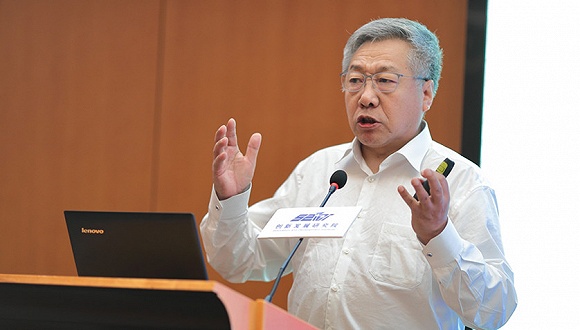
Photo source: Shenzhen Institute of Modern innovation and development
At present, the basic old-age insurance for urban workers in our country adopts the system of combining social pooling with personal accounts. As a secondary distribution, old-age insurance is often given the important task of implementing redistribution fairness by people. How to treat fairness and efficiency in the top-level design of social security?
On May 10, Bing-Wen Zheng, director of the World Social Security Research Center of Chinese Academy of Social Sciences, said in a speech at Shenzhen Institute of Modern innovation and development that under the condition that the fairness of domestic social security is still imperfect, in order to ensure the financial sustainability of the social security system, the country should transform to “nominal accounts”, encourage people to pay more, expand personal accounts and reduce social overall planning.
Bing-Wen Zheng said that fairness can be divided into two major concepts: Intra-generation fairness and inter-generation fairness. Among them, intra-generational equity refers to the transfer payment from the rich to the poor, the transfer from male retirees to female retirees, the transfer between spouses, the transfer from the system to the disabled, and the fair payment, the total value of old-age wealth and equity among groups.
“These seven points are the key to measure the fairness of the pension system,” Bing-Wen Zheng said, there is still a lack of intra-generation fairness in China, but inter-generation fairness is not at all, therefore, the key problem of the social security system is that the big pot is very powerful, which leads to the poor financial sustainability of everyone.
In view of the current situation of financial sustainability of China’s social security system, Bing-Wen Zheng points out that 1/3 of the social security expenses that should be collected in China have not been recovered, and the annual accounts are the same.
He took the data of 2013 as an example. In 2013, the real income of the domestic people’s wages added together was 9.64 trillion. The factor of throwing away 20% of the payment of individual industrial and commercial households was 2.7 trillion, however, it was a pity that only 1.7 trillion yuan was received that year, and 1/3 yuan was less.
Why are people unwilling to pay according to their own wages? “Everyone is willing to lower the fee base and then lower the rate, which leads to the failure to collect the money.” Bing-Wen Zheng said that we should make everyone willing to pay more money from the heart and get more pension in the future. The system is also appropriate and the individual is also appropriate. This is a goal that the system should be reformed.
Bing-Wen Zheng believes that in order to increase the real income of social security expenses, expanding personal accounts is the only way. If we narrow down personal accounts, expand social planning, and take away the money from personal accounts, this results in empty accounts.
According to the “China pension Development Report 2016” edited by the Chinese Academy of Social Sciences, as of 2015, the total balance of the basic endowment insurance fund for urban workers was 3534.5 billion yuan, while the total balance of personal accounts was 4714.4 billion yuan. Bing-Wen Zheng pointed out that in 2015, the actual funds in the account were less than one tenth, and the empty account was as high as 4.4 trillion. The account money was used for current payment.
“The Third Plenary Session proposed to transform to a nominal account. After the transformation to a nominal account, another important point is to expand the account. The proportion of the account can only be expanded when it is a nominal account, when making real accounts, you must narrow down to complete the revolutionary task,” Bing-Wen Zheng said, expanding the proportion of personal accounts is a path that must be taken.
At present, eight countries including Sweden, Italy, Russia and Poland have implemented the “nominal account” mode, and “nominal account” is like “bank account”, although the money in the account has been invested or lent, even the original profit can be taken out at retirement, which is completely personal, and the bank will take care of the preservation.
Bing-Wen Zheng said that after the expansion of the account proportion, people’s sense of acquisition is real. People can see money, which is a sense of acquisition for individuals. For the national reform, structural reform on the supply side has been realized.
Some people think that the larger the account is, the smaller the horizontal adjustment part and the Social overall planning part are, the smaller the redistribution function is, which is the main reason for criticizing large accounts. On the issue of fairness in the top-level design of social security, Bing-Wen Zheng believes that it should be reunderstood.
He pointed out that Social Security Fairness has a strong historical stage. Sustainability and fairness are the relationship between leather and wool. The social insurance system cannot be a big deal. We must have the thinking of “great fairness, the extension of fairness has a sense of the times.
“The so-called redistribution means that the poor take advantage of the rich, but from an advanced perspective, no one takes advantage of others, and the system of taking advantage of others is unsustainable.” Bing-Wen Zheng said that Social Security fairness should be understood based on Chinese traditional culture, and “actuarial fairness” should be used instead of “redistribution fairness”.
1888
Photo source: Shenzhen Institute of Modern innovation and development at present, the basic old-age insurance for urban workers in our country adopts a system combining social pooling and personal accounts. Old-age insurance is used as a secondary distribution, people are often given the importance of implementing redistribution fairness.